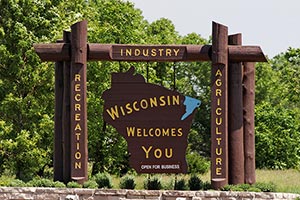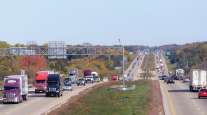New Wisconsin Transport Secretary: Audit Signals We Must 'Change the Culture,' Be Transparent

Wisconsin’s new transportation secretary vowed Feb. 21 to “change the culture” at the Department of Transportation after an audit found it underestimated highway project costs by more than $3 billion, in part by failing to account for inflation.
Dave Ross’ comments came during a legislative hearing on a recent state audit of the DOT highway program.
Lawmakers said the audit raises broad questions about DOT management, including whether lawmakers must oversee highway projects more closely.
Lawmakers and Ross signaled they will adopt recommendations in the audit, which Ross called a “template” to improve the agency.
Ross replaced Mark Gottlieb as transportation secretary in January. Acknowledging the audit found “inefficiencies,” Ross told members of the Joint Legislative Audit Committee that DOT must become more transparent and “break down silos” between its regional offices.
“We need to become more performance-driven. We need to become more accurate,” Ross said. “We need to build back up DOT’s confidence in your eyes.”
As examples of where the department must improve, Ross highlighted cost overruns on two Dane County projects: expansion and reconstructions of Verona Road and the Madison Beltline and of Interstate 39-90 from the Beltline to the Illinois state line.
Since lawmakers approved both projects in 2011, the Verona Road price tag has soared from $150 million to $283.3 million and the I-39-90 cost rose from $715 million to $1.2 billion.
The $1.2 billion estimate excludes an additional estimate of $550 million to rebuild the I-39-90 interchange with the Beltline, which was included in the original $715 million figure. The Wisconsin State Journal reported earlier this month that the DOT had quietly separated the Beltline Interchange from the larger project.
A bill draft circulated before the Feb. 21 hearing would require DOT to implement recommendations from the audit. One of them, by requiring project cost updates to account for the full scope of the project as initially approved by lawmakers, would prevent DOT from quietly splitting up projects in a way that makes them appear less costly.
Ross specifically addressed the interchange in his testimony Feb. 21, saying, “I do not accept” the $550 million cost estimate for the interchange and vowing to re-examine it. He appeared to fault the department for excluding the interchange from its most recent report to the state Transportation Projects Commission.
“One small thing wasn’t in there: a $550 million project,” Ross said. “It was surprising to us. How is it, if we’re going to build confidence with you as an agency, and miss $550 million in a report?”
Lawmakers hinted at the implications the audit findings could have for the state’s next transportation budget, debate on which is expected to be contentious.
The audit, in addition to project cost overruns, also found the DOT could save money by taking steps to curb engineering and construction costs. The findings have become a rallying cry for lawmakers, who say DOT must find more cost savings before they contemplate increasing gas taxes or vehicle fees. That includes some conservative GOP lawmakers and Gov. Scott Walker, whose 2017-19 budget proposal holds the line on taxes and fees.
“Giving [DOT] more money would be absolutely the wrong thing to do at this point,” state Sen. Chris Kapenga said.
Others, such as state Rep. John Nygren, see it differently. He, along with fellow Assembly GOP leaders and legislative Democrats, is open to tax or fee hikes to resolve the transportation-funding imbalance.
Nygren noted the audit findings also say Wisconsin’s highway conditions are deteriorating and compare poorly to neighboring states. “Even after we make those reforms [outlined in the audit], we’re still in a position where, I believe, there’s a shortfall,” Nygren said.
State Sen. Kathleen Vinehout, citing the I-39-90 expansion project, said DOT is making costly changes to projects on its own authority. Lawmakers may need to respond by exercising more oversight over project changes, she said.
Vinehout also questioned the DOT’s methods for divvying up road funding among its regional districts. The audit recommends that method be updated and explained to lawmakers.
Sen. Alberta Darling said issues raised in the audit largely are attributable to its decision-makers.
“Something really has to change in the management,” Darling said.
The audit of the state’s highway program found the DOT dramatically underestimated the cost of major highway projects over decades by failing to account for inflation and other factors. Costs on 16 large highway projects currently under construction have more than doubled from what the department originally estimated.
Those figures don’t account for additional overruns on completed projects. On 19 highway projects completed from 2006 to 2015, costs exceeded initial estimates by $772.5 million, the audit found.
The draft bill circulated before the Feb. 21 hearing would require DOT to account for inflation and other factors, such as environmental studies, engineering or land acquisition, in future project cost estimates. It also has recommendations for actions by DOT, including providing more information to lawmakers about highway project costs and compiling such information, including explanations for major cost increases, in a central location. State Sen. Rob Cowles, co-chairman of the panel, said he expects the panel to watch the DOT closely in coming months to see how it responds to the audit.
“This committee is going to have to have ongoing dialogue … back and forth with the agency,” Cowles said.
Distributed by Tribune Content Agency, LLC




